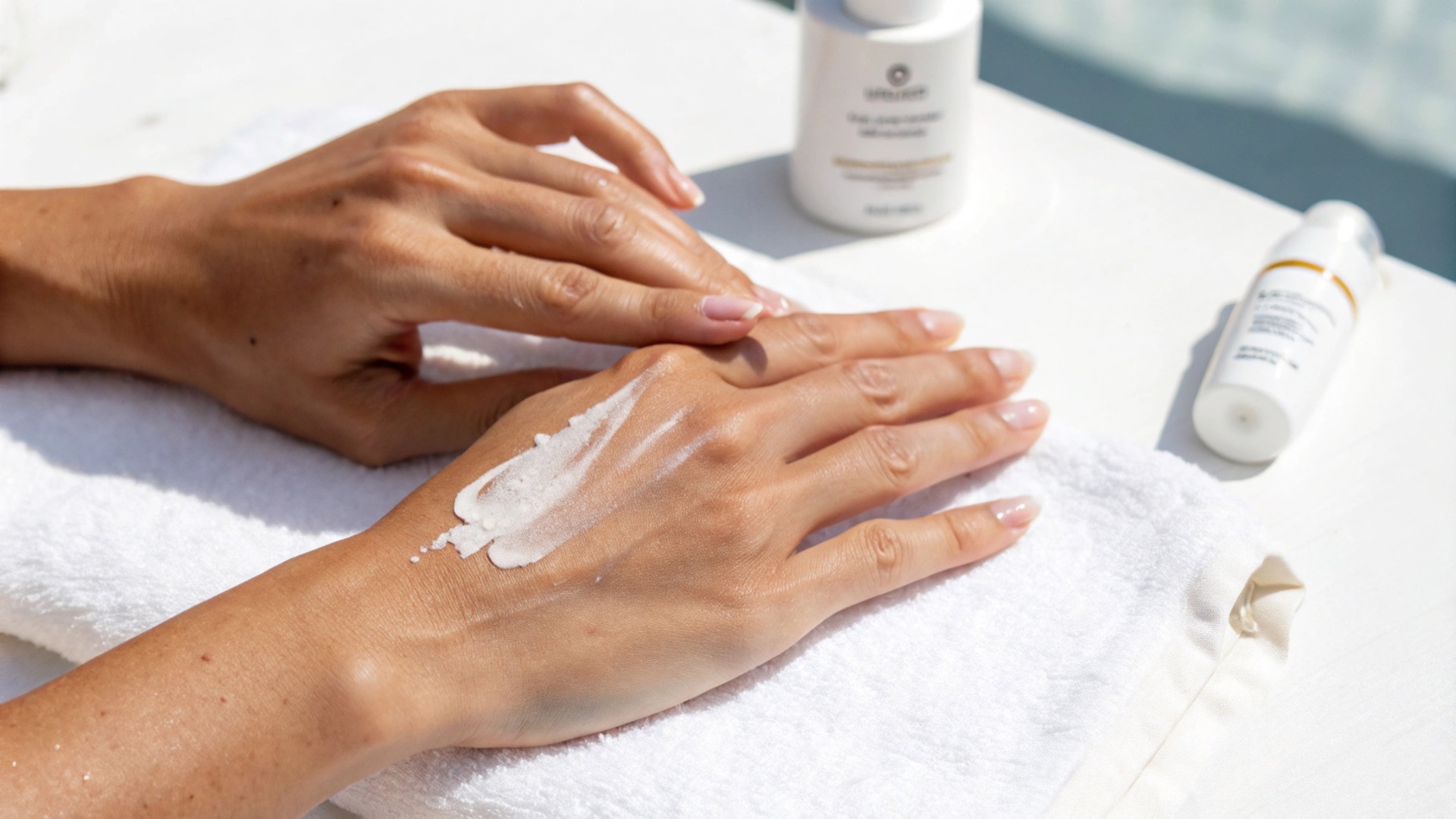Key takeaways
- Peptide therapy uses small protein fragments to trigger natural anti-aging processes in your skin and body. Clinical studies show measurable improvements in wrinkles, skin elasticity, and overall appearance within 8-12 weeks.
- Both topical and oral peptide treatments offer proven benefits, with synthetic peptides often outperforming natural alternatives.
- Neuromodulating peptides can reduce expression lines by interfering with muscle contractions that cause wrinkles. Collagen peptides help rebuild the skin’s structural foundation from the inside out.
Overview
The quest for younger-looking skin has led millions to explore countless treatments and products. But what if the most promising solution wasn’t found in expensive creams or invasive procedures, but in the very building blocks of life itself?
Peptide therapy represents a breakthrough approach to anti-aging that works at the cellular level. Unlike topical treatments that only address surface concerns, peptides can signal your skin to produce more collagen, reduce inflammation, and repair damage from within.
This emerging field combines cutting-edge science with natural biological processes to deliver results that many thought impossible without surgery. Naturally occurring peptides are key components in anti-aging therapies, as they stimulate essential biological processes such as skin regeneration and immune modulation.
As a rapidly growing area of anti-aging medicine, peptide therapy offers hope for those seeking practical, science-backed solutions. Research shows that specific peptides can improve skin elasticity by up to 50% and reduce fine lines significantly within just 12 weeks of treatment.
What is peptide therapy?
Peptide therapy is an advanced anti-aging treatment that uses short chains of amino acids (peptides) to communicate with your cells and trigger specific biological responses. Think of peptides as molecular messengers that tell your skin to behave like it did when you were younger.
These tiny protein fragments occur naturally in your body and play crucial roles in cellular repair, collagen production, and overall skin health. Peptide hormones are a class of peptides that regulate essential physiological processes and are often used therapeutically.
However, as we age, our natural peptide production declines, leading to visible signs of aging like wrinkles, sagging skin, and loss of elasticity. This decline can also contribute to hormone deficiencies, which peptide therapy can help address.
The concept emerged from decades of research into how our bodies naturally repair and regenerate tissue. Scientists discovered that by introducing specific peptides either topically or systemically, they could essentially “reprogram” aging cells to function more youthfully. Peptides interact with specific biological targets in the body to trigger these desired responses.
Types of anti-aging peptides
Neuromodulating and growth hormone peptides
Neuromodulating peptides work by interfering with the nerve signals that cause facial muscle contractions. These peptides act as competitive inhibitors in the neuromuscular junction, similar to how Botox works, but through a different mechanism.
Neuromodulating peptides often act by binding to target proteins involved in muscle contraction signaling pathways. Research shows that peptides like acetyl hexapeptide-3 (Argireline) can reduce wrinkle depth by up to 48.9% in controlled studies.
They target the SNARE complex, which is responsible for releasing acetylcholine, the neurotransmitter that signals muscles to contract. This process involves the interaction of two proteins, a key focus in computational modeling of peptide-protein interactions.
The beauty of neuromodulating peptides lies in their ability to provide both immediate and long-term benefits. Users often notice smoother skin within 15 minutes of application, while continued use leads to lasting improvements in expression lines.
Collagen peptides
Collagen peptides represent the most widely studied category in anti-aging research. These peptides work by stimulating fibroblasts – the cells responsible for producing collagen, elastin, and other structural proteins in your skin. Cyclic peptides, a structurally unique class of peptides with enhanced stability, are also being explored for their potential in anti-aging therapies due to their resistance to proteolytic degradation and ability to maintain biological activity.
Clinical trials demonstrate that collagen peptides can increase skin elasticity by 25% and reduce eye wrinkles significantly after just 4-8 weeks of treatment. The most effective sequences include palmitoyl pentapeptide-4 (Pal-KTTKS), which is derived from type I procollagen.
The specific arrangement of amino acid residues in these peptides is critical for their stability and biological activity. What makes collagen peptides particularly effective is their bioavailability. When taken orally, specific dipeptides and tripeptides containing hydroxyproline can survive digestion and reach skin tissue through blood circulation, remaining active for up to 14 days.
Copper and trace element peptides
Copper peptides, such as the well-known copper peptide GHK-Cu (glycyl-histidyl-lysine-copper), have shown remarkable anti-aging properties. These peptides not only stimulate collagen production but also possess antioxidant properties and can improve skin firmness.
Studies reveal that copper peptides can significantly improve skin elasticity, reduce fine lines, and enhance overall skin appearance. They work by supporting the skin’s natural wound healing processes and promoting the synthesis of essential structural proteins.
These structural proteins are often derived from or inspired by natural proteins found in the body, which play a crucial role in maintaining healthy skin.
The addition of trace elements like manganese creates peptide complexes that can treat photodamage and improve skin texture when applied topically for 12 weeks or more.
Clinical evidence and results
Short-term effects
Research consistently shows that peptide therapy can deliver noticeable results remarkably quickly. In controlled studies, participants experienced measurable improvements in fine lines and skin texture within just 15 minutes of peptide application. These rapid effects are often attributed to the action of short peptides, which can quickly interact with cellular targets.
A recent randomized, double-blind, placebo-controlled study found that 97% of subjects showed improvement in fine lines after a single application of neuromodulating peptides. This immediate effect is attributed to the rapid interaction between peptides and neuromuscular pathways.
These quick results help improve treatment compliance, as users can see immediate benefits that encourage continued use for long-term anti-aging effects.
Long-term transformations
The most impressive results from peptide therapy emerge with consistent long-term use. Clinical trials spanning 12 weeks show that participants achieve:
- 100% of subjects experienced improvement in fine lines and overall skin appearance
- 97% showed enhanced skin texture with a median improvement of 33%
- 94% demonstrated increased skin radiance with significant brightening effects
- 67% achieved wrinkle reduction with measurable decreases in depth and volume
Advanced imaging technology confirms these improvements, with 3D analysis showing reduced wrinkle count, decreased total wrinkle length, and improved skin surface smoothness.
Ongoing peptide drug development efforts are focused on optimizing long-term efficacy and safety for anti-aging applications.
Topical vs. oral peptide delivery: How do they compare?
Topical applications
Topical peptide treatments offer targeted delivery directly to problem areas. Modern formulations use lipophilic modifications like palmitoyl or acetyl groups to improve skin penetration. These modifications can increase absorption rates by 100-1000 times compared to unmodified peptides.
The key advantage of topical application is precision – you can target specific areas like crow’s feet or forehead lines. However, skin barrier penetration remains a challenge, which is why advanced delivery systems are crucial for effectiveness.
Professional-grade topical peptide serums typically show results within 4-8 weeks, with optimal benefits achieved after 12 weeks of consistent use.
Oral supplements and supplementation
Oral peptide therapy works systemically, providing benefits throughout the body. Collagen peptides taken orally are partially digested into bioactive dipeptides and tripeptides that can reach skin tissue through blood circulation.
Research using stable isotope labeling confirms that oral collagen peptides are absorbed and distributed to skin tissue, where they can remain active for extended periods. This systemic approach offers comprehensive anti-aging benefits beyond just facial skin.
Oral peptide therapy typically requires 4-12 weeks to show visible improvements, but the effects tend to be more comprehensive and longer-lasting than topical treatments alone.
Bottom line
Peptide therapy represents a scientifically backed revolution in anti-aging treatment. Unlike temporary fixes or harsh interventions, peptides work with your body’s natural processes to restore youthful skin function from within.
The clinical evidence is compelling: peptide therapy can deliver measurable improvements in skin texture, fine lines, and overall appearance. Whether you choose topical applications for targeted treatment or oral supplementation for comprehensive benefits, peptides offer a safe and effective path to healthier, younger-looking skin.
Ready to explore peptide therapy? Start by consulting with a qualified practitioner who can recommend the most appropriate peptide treatments for your specific skin concerns and anti-aging goals. The future of anti-aging is here, and it’s built on the fundamental building blocks of life itself.
Frequently Asked Questions (FAQs)
- How quickly can I expect to see results from peptide therapy?
Results vary by peptide type and delivery method. Neuromodulating peptides can show immediate effects within 15 minutes, while collagen-stimulating peptides typically require 4-8 weeks for visible improvements. Most clinical studies show optimal results after 12 weeks of consistent use.
- Are there any side effects or risks with peptide therapy?
Peptide therapy is generally well-tolerated with minimal side effects. Clinical trials report no significant adverse reactions, and peptides are considered highly safe and hypoallergenic. Some people may experience mild skin irritation with topical applications, but this is rare. Peptide therapy may also support a healthy immune system by replenishing peptides that decline with age.
- How do peptides compare to other anti-aging treatments?
Peptides offer unique advantages over traditional treatments. Unlike Botox injections, peptides work gradually and naturally without freezing facial expressions. Compared to retinoids, peptides are gentler and suitable for sensitive skin while still delivering significant anti-aging benefits. Peptide therapy can also help maintain or restore optimal hormone levels, which is important for overall health and anti-aging.
- Can I combine peptide therapy with other skincare treatments?
Yes, peptides are highly compatible with other anti-aging ingredients. They can be safely combined with antioxidants like vitamin C, moisturizing ingredients like hyaluronic acid, and even trace elements. This compatibility allows for comprehensive anti-aging skincare routines.
- What’s the difference between natural and synthetic peptides?
Both natural and synthetic peptides can be effective, but synthetic peptides often offer advantages in stability, potency, and targeted action. Synthetic peptides can be designed for specific functions and modified for better skin penetration, while natural peptides may be less stable and harder to absorb.
References
- Nguyen, T. Q., Zahr, A. S., Kononov, T., & Ablon, G. (2021). A randomized, double-blind, placebo-controlled clinical study investigating the efficacy and tolerability of a peptide serum targeting expression lines. Journal of Clinical and Aesthetic Dermatology, 14(5), 14-21.
- Zhao, X., Zhang, X., & Liu, D. (2021). Collagen peptides and the related synthetic peptides: A review on improving skin health. Journal of Functional Foods, 86, 104680.









